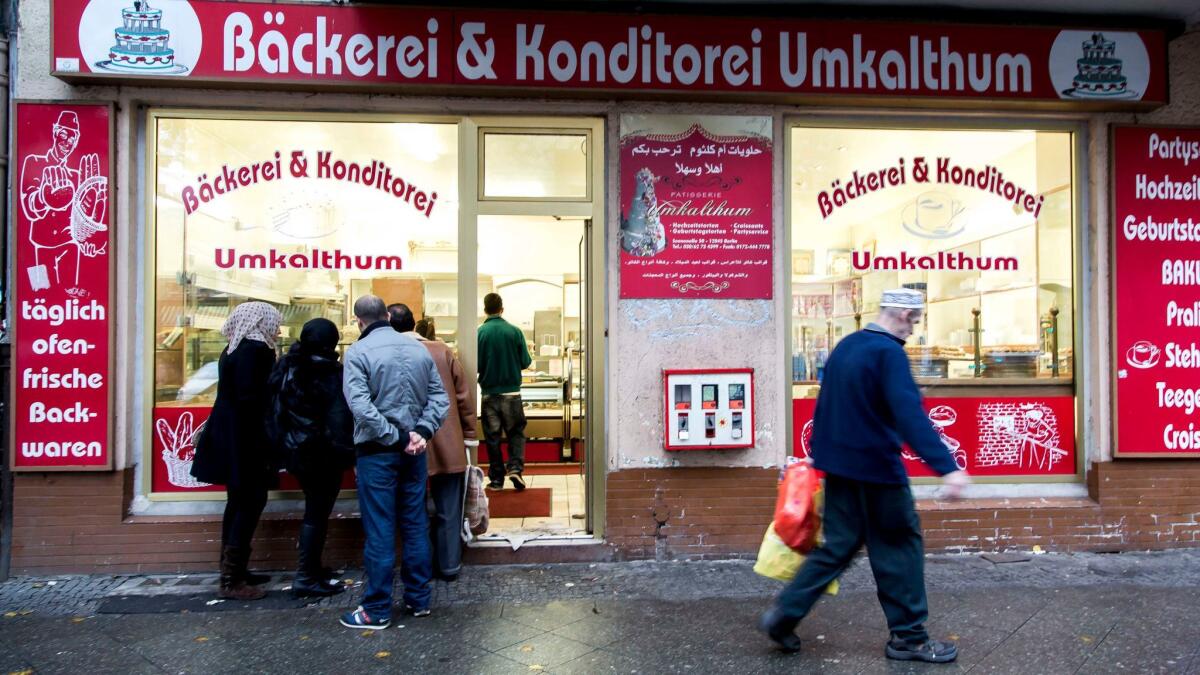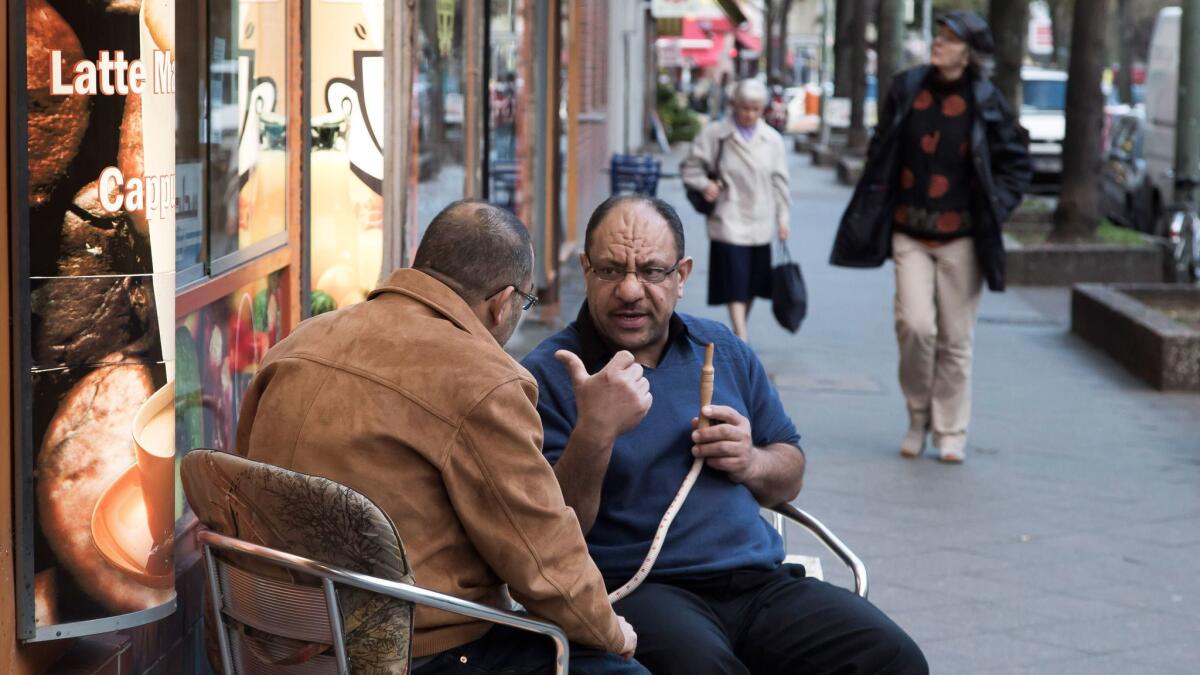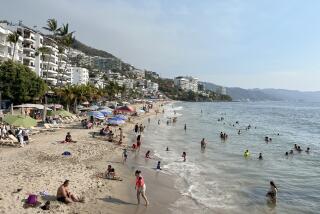This Berlin boulevard bustles with the sights, sounds and scents of the Middle East

To get to the Middle East from the center of Berlin, you need only a $3 ticket for a short subway ride that will transport you to another world in less than 10 minutes.
Trudging up the concrete steps from yellow subway line No. 8 at Hermannplatz square, you arrive on a bustling shopping boulevard filled with the sights, sounds and scents of the Middle East. It might be just a few short miles south of the tidy German government quarter, but it feels like a distinctly different country.
The avenue is called Sonnenallee (Sun Alley), but the three-mile-long boulevard stretching across south-central Berlin is better known as Arabische Strasse (Arab Street). It is more chaotic and charismatic than most Berlin streets — a delightful mix of cultures featuring an abundance of women in head scarves, men with long beards, and animated discussions taking place on every street corner.
Arabic is the ubiquitous language. There’s hardly anything German left over except the street names. Sonnenallee has become a home away from home for tens of thousands of Syrians, Iraqis, Lebanese, Palestinians, Jordanians and other Middle Easterners who have settled in Berlin after fleeing war and poverty.
The flood of more than a million refugees to Germany over the last 18 months has not only boosted the fortunes of many of the shops that cater to the needs and tastes of Arabic-speaking arrivals. The new masses have also helped further establish the boulevard as an important anchor for people who feel either homesick or otherwise lost in what many see as a frosty and overly bureaucratic German world.
Syrians want to accomplish something with their lives and don’t like just sitting around or waiting for a handout from the government.
— Rafik Almadah, who owns an ice cream shop
Even on a dreary and bone-numbingly cold December afternoon, it’s impossible to escape the warmth steaming out of the extraordinarily friendly people you encounter here.
“It feels a bit like home,” said Ahmad Dasoqi, a 31-year-old bookkeeper who fled Syria two years ago. After quickly learning German and the basics of cooking while working as a short-order cook, he opened a Syrian restaurant with two friends.
Called Aldimanshqi (the Damascan), it’s a hot spot where about 20 refugees have since found jobs.
“Things are going really well for us,” Dasoqi said. “We make the same kind of good food that people love back home, and I think that’s why so many come in here. Syrians are hard workers and, like me, they’re just thankful to be in Germany.”
They aren’t always so thankful for the German diet, however. So they pack Aldimanshqi — no pork sausages or pickled herring here — from early in the morning until late in the evening.
Amid a steady stream of customers ordering from the Arabic menu in their native tongue, diners who huddled around the small restaurant’s crowded tables said they traveled from across Berlin for the tasty chicken shawarma, chicken kabob, falafel or musabaha, a whole-chickpea hummus.
“Two Syrian friends who didn’t speak any German asked me a year ago if I could help them open up a restaurant,” said Dasoqi. “None of us had much experience in restaurants, but I thought, why not? We were confident it would work out.”
There is an irrepressible entrepreneurial spirit among the Syrian refugees, some 60,000 of whom have ended up in Berlin in the last year. About 90% of the shops on Sonnenallee are run by Arabs, the Neukoelln district Mayor Franziska Giffey said recently. There are about 33,000 Middle Eastern residents in Neukoelln, home to about one-fourth of Berlin’s rapidly growing population from the region.
“We’re not afraid to take chances,” said Rafik Almadah, who opened a Syrian ice cream shop called Bab al Hara Oriental Ice Cream in 2013 after importing used ice cream making machinery from Damascus. “Personally, I love risk-taking. Syrians want to accomplish something with their lives and don’t like just sitting around or waiting for a handout from the government or someone to give them a job.”
Almadah, 43, came to Germany 14 years ago. He stayed in Berlin, worked double shifts at an Italian ice cream parlor across town for years, saving his money to be able to open up his own shop. He now has three Syrian refugees on his six-person staff and feels bad that he had to turn down most of the hundreds of others coming into his shop looking for a job.
“Germany isn’t an easy place for Syrians,” he said. “In Germany, you have to learn to be patient.”
Sonnenallee was once a working-class German street. Around the time that the Berlin Wall fell in 1989, it became a popular, low-rent destination for Turks squeezed out of nearby districts by post-Cold War gentrification and rising rents. It was also becoming a new home for thousands from Lebanon who fled civil war. The smoke-filled corner pubs selling beer and the currywurst stands that once filled with Germans have long since been replaced by shisha lounges, fruit and vegetable stands and barbershops, among other businesses that cater to the immigrants.

Most shops advertise their wares with signs in Arabic. Everyone on the street seems eager to talk about war and peace in Syria.
“Arab people like to come in here because this is a place where they feel like at home,” said Issa Mardinli, 52, who fled Aleppo, Syria, and now runs a variety store whose wares include cheap pots and pans, household tools and and children’s clothing. “Sure, I feel homesick at times too. But what can you do? The situation in Aleppo is horrible.”
Mahmoud Fakhro came to Berlin from Lebanon as a child. Now 28, he works in his father’s popular Umkalthum bakery, named after a famous Egyptian singer and known for its pistachio baklava.
“Most of the people who come here don’t speak any German, so they’re happy to be here to hear the language they understand,” Fakhro said as customers left with bags full of baked goods and new waves streamed in. “They see the Arabic letters on our sign and are happy to come in.”
He believes more Syrians will be starting their own shops before long.
A few vestiges of the once-dominant German culture remain. A German restaurant called Pape’s Gasthaus has been closed for months, and a young man selling Christmas trees on a street corner said that business was slow. A German goldsmith named Marko warily unlocked the door to his shop to allow one guest at a time in and said that business has been slowing down.
“Fewer and fewer Germans come down to shop on Sonnenallee anymore,” said Marko, who declined to provide his last name for fear his comments would be seen as biased against immigrants. “They feel lost on a street like this where almost everything is in Arabic and hardly anyone speaks German. They struggle to recognize their old neighborhood and wonder: How did they end up in Damascus or Baghdad?”
Kirschbaum is a special correspondent.
ALSO
German Chancellor Angela Merkel calls for ban on full-face veils and for fewer migrants
Italy says thousands of Nigerian women who arrive as migrants are forced to work as prostitutes
A newspaper’s closure sparks fury — and concern over Hungary’s rightward drift
More to Read
Sign up for Essential California
The most important California stories and recommendations in your inbox every morning.
You may occasionally receive promotional content from the Los Angeles Times.









